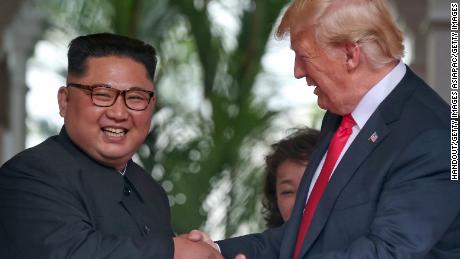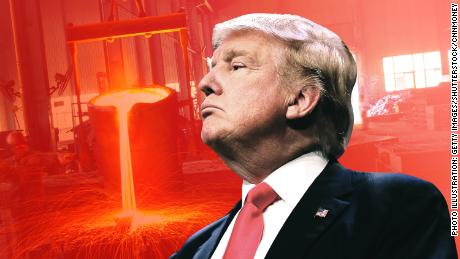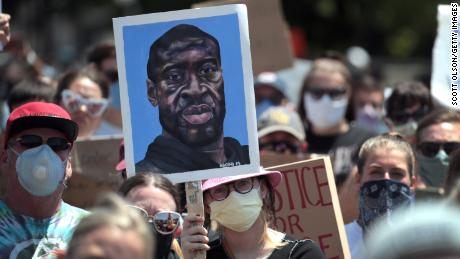Trump is right. His trade war with China is undermining diplomatic efforts to denuclearize North Korea, as well as other US objectives.Trump promised Americans that a trade war would be "good and easy to win." While the trade war may be hurting China more than the US, tariffs are also taking a toll on American soybean farmers and businesses that rely on Chinese imports. Experts expect American consumers to be hit hard if the reciprocal tariffs keep escalating. On Thursday, as trade talks between American and Chinese officials failed to make any progress, the Trump administration's tariffs on $16 billion worth of Chinese goods went into effect. China retaliated in kind with its own tariffs on a similar amount of US goods. Trump has threatened to impose another round of tariffs on $200 billion worth of Chinese imports and Beijing is ready to keep the cycle going.Trump still seems to think that this trade war is going to lead to an easy win. Earlier this week, Trump boasted at a rally: "When I came we were heading in a certain direction that was going to allow China to be bigger than us in a very short period of time. That's not going to happen anymore." Trump's attitude is being interpreted in Beijing as a sign that Trump doesn't just want to equalize a trade imbalance, but instead wants to stop China's growth altogether. That has rankled Beijing, with some likening it to the start of a new Cold War.
On Thursday, as trade talks between American and Chinese officials failed to make any progress, the Trump administration's tariffs on $16 billion worth of Chinese goods went into effect. China retaliated in kind with its own tariffs on a similar amount of US goods. Trump has threatened to impose another round of tariffs on $200 billion worth of Chinese imports and Beijing is ready to keep the cycle going.Trump still seems to think that this trade war is going to lead to an easy win. Earlier this week, Trump boasted at a rally: "When I came we were heading in a certain direction that was going to allow China to be bigger than us in a very short period of time. That's not going to happen anymore." Trump's attitude is being interpreted in Beijing as a sign that Trump doesn't just want to equalize a trade imbalance, but instead wants to stop China's growth altogether. That has rankled Beijing, with some likening it to the start of a new Cold War. So it's no surprise that we're seeing the diplomatic consequences of our deteriorating relationship with China. The cancellation of Pompeo's visit to North Korea shows that Trump may be beginning to grasp just how significant a problem this could be for US national security. Pyongyang has a long history of promising to denuclearize and subsequently failing to follow through. It's not because of China that North Korea is repeating this pattern and failing to give up their weapons. But China wields leverage over North Korea by virtue of being its largest trading partner (it accounts for more than 90% of North Korea's foreign trade) and Beijing could exert more economic pressure on Pyongyang. That could force North Korean leader Kim Jong Un to choose whether to feed his people or continue to pursue his nuclear weapons program. Instead, China is giving North Korea a pass by failing to comply with existing sanctions.
So it's no surprise that we're seeing the diplomatic consequences of our deteriorating relationship with China. The cancellation of Pompeo's visit to North Korea shows that Trump may be beginning to grasp just how significant a problem this could be for US national security. Pyongyang has a long history of promising to denuclearize and subsequently failing to follow through. It's not because of China that North Korea is repeating this pattern and failing to give up their weapons. But China wields leverage over North Korea by virtue of being its largest trading partner (it accounts for more than 90% of North Korea's foreign trade) and Beijing could exert more economic pressure on Pyongyang. That could force North Korean leader Kim Jong Un to choose whether to feed his people or continue to pursue his nuclear weapons program. Instead, China is giving North Korea a pass by failing to comply with existing sanctions. This isn't anything new. China has at times worked with the international community to pressure North Korea. More often than not, however, China has failed to implement international sanctions. But there's more at stake this time. In April, Trump credited Chinese President Xi Jinping for being a constructive partner on North Korea, tweeting: "Please do not forget the great help that my good friend, President Xi of China, has given to the United States, particularly at the Border of North Korea. Without him, it would have been a much longer, tougher, process!" But now Xi is playing a very different role. While US intelligence, as well as reporting from the International Atomic Energy Agency, indicates that North Korea may still be developing its nuclear program, Xi has suggested ending sanctions against North Korea. Xi is reportedly also considering going to Pyongyang in September. A visit by Xi would be a huge diplomatic win for Kim, as it would be the first visit by a Chinese president to North Korea since the hermit kingdom's resumed its missile testing in 2006. China is also taking other worrying steps. It is participating in Russia's Vostok 2018 war games, which begin at the end of the month, the first time China has taken part in this military exercise. And last month, China joined Russia's aerial drills, another first for Sino-Russia cooperation.China has the ability to undermine our objectives across the globe. Trump's acknowledgment that Beijing is not helping us with North Korea is just the beginning of the diplomatic fallout we may see from his trade war.
This isn't anything new. China has at times worked with the international community to pressure North Korea. More often than not, however, China has failed to implement international sanctions. But there's more at stake this time. In April, Trump credited Chinese President Xi Jinping for being a constructive partner on North Korea, tweeting: "Please do not forget the great help that my good friend, President Xi of China, has given to the United States, particularly at the Border of North Korea. Without him, it would have been a much longer, tougher, process!" But now Xi is playing a very different role. While US intelligence, as well as reporting from the International Atomic Energy Agency, indicates that North Korea may still be developing its nuclear program, Xi has suggested ending sanctions against North Korea. Xi is reportedly also considering going to Pyongyang in September. A visit by Xi would be a huge diplomatic win for Kim, as it would be the first visit by a Chinese president to North Korea since the hermit kingdom's resumed its missile testing in 2006. China is also taking other worrying steps. It is participating in Russia's Vostok 2018 war games, which begin at the end of the month, the first time China has taken part in this military exercise. And last month, China joined Russia's aerial drills, another first for Sino-Russia cooperation.China has the ability to undermine our objectives across the globe. Trump's acknowledgment that Beijing is not helping us with North Korea is just the beginning of the diplomatic fallout we may see from his trade war.
Original Article
Trump is right. His trade war with China is undermining diplomatic efforts to denuclearize North Korea, as well as other US objectives.Trump promised Americans that a trade war would be "good and easy to win." While the trade war may be hurting China more than the US, tariffs are also taking a toll on American soybean farmers and businesses that rely on Chinese imports. Experts expect American consumers to be hit hard if the reciprocal tariffs keep escalating. On Thursday, as trade talks between American and Chinese officials failed to make any progress, the Trump administration's tariffs on $16 billion worth of Chinese goods went into effect. China retaliated in kind with its own tariffs on a similar amount of US goods. Trump has threatened to impose another round of tariffs on $200 billion worth of Chinese imports and Beijing is ready to keep the cycle going.Trump still seems to think that this trade war is going to lead to an easy win. Earlier this week, Trump boasted at a rally: "When I came we were heading in a certain direction that was going to allow China to be bigger than us in a very short period of time. That's not going to happen anymore." Trump's attitude is being interpreted in Beijing as a sign that Trump doesn't just want to equalize a trade imbalance, but instead wants to stop China's growth altogether. That has rankled Beijing, with some likening it to the start of a new Cold War.
On Thursday, as trade talks between American and Chinese officials failed to make any progress, the Trump administration's tariffs on $16 billion worth of Chinese goods went into effect. China retaliated in kind with its own tariffs on a similar amount of US goods. Trump has threatened to impose another round of tariffs on $200 billion worth of Chinese imports and Beijing is ready to keep the cycle going.Trump still seems to think that this trade war is going to lead to an easy win. Earlier this week, Trump boasted at a rally: "When I came we were heading in a certain direction that was going to allow China to be bigger than us in a very short period of time. That's not going to happen anymore." Trump's attitude is being interpreted in Beijing as a sign that Trump doesn't just want to equalize a trade imbalance, but instead wants to stop China's growth altogether. That has rankled Beijing, with some likening it to the start of a new Cold War. So it's no surprise that we're seeing the diplomatic consequences of our deteriorating relationship with China. The cancellation of Pompeo's visit to North Korea shows that Trump may be beginning to grasp just how significant a problem this could be for US national security. Pyongyang has a long history of promising to denuclearize and subsequently failing to follow through. It's not because of China that North Korea is repeating this pattern and failing to give up their weapons. But China wields leverage over North Korea by virtue of being its largest trading partner (it accounts for more than 90% of North Korea's foreign trade) and Beijing could exert more economic pressure on Pyongyang. That could force North Korean leader Kim Jong Un to choose whether to feed his people or continue to pursue his nuclear weapons program. Instead, China is giving North Korea a pass by failing to comply with existing sanctions.
So it's no surprise that we're seeing the diplomatic consequences of our deteriorating relationship with China. The cancellation of Pompeo's visit to North Korea shows that Trump may be beginning to grasp just how significant a problem this could be for US national security. Pyongyang has a long history of promising to denuclearize and subsequently failing to follow through. It's not because of China that North Korea is repeating this pattern and failing to give up their weapons. But China wields leverage over North Korea by virtue of being its largest trading partner (it accounts for more than 90% of North Korea's foreign trade) and Beijing could exert more economic pressure on Pyongyang. That could force North Korean leader Kim Jong Un to choose whether to feed his people or continue to pursue his nuclear weapons program. Instead, China is giving North Korea a pass by failing to comply with existing sanctions. This isn't anything new. China has at times worked with the international community to pressure North Korea. More often than not, however, China has failed to implement international sanctions. But there's more at stake this time. In April, Trump credited Chinese President Xi Jinping for being a constructive partner on North Korea, tweeting: "Please do not forget the great help that my good friend, President Xi of China, has given to the United States, particularly at the Border of North Korea. Without him, it would have been a much longer, tougher, process!" But now Xi is playing a very different role. While US intelligence, as well as reporting from the International Atomic Energy Agency, indicates that North Korea may still be developing its nuclear program, Xi has suggested ending sanctions against North Korea. Xi is reportedly also considering going to Pyongyang in September. A visit by Xi would be a huge diplomatic win for Kim, as it would be the first visit by a Chinese president to North Korea since the hermit kingdom's resumed its missile testing in 2006. China is also taking other worrying steps. It is participating in Russia's Vostok 2018 war games, which begin at the end of the month, the first time China has taken part in this military exercise. And last month, China joined Russia's aerial drills, another first for Sino-Russia cooperation.China has the ability to undermine our objectives across the globe. Trump's acknowledgment that Beijing is not helping us with North Korea is just the beginning of the diplomatic fallout we may see from his trade war.
This isn't anything new. China has at times worked with the international community to pressure North Korea. More often than not, however, China has failed to implement international sanctions. But there's more at stake this time. In April, Trump credited Chinese President Xi Jinping for being a constructive partner on North Korea, tweeting: "Please do not forget the great help that my good friend, President Xi of China, has given to the United States, particularly at the Border of North Korea. Without him, it would have been a much longer, tougher, process!" But now Xi is playing a very different role. While US intelligence, as well as reporting from the International Atomic Energy Agency, indicates that North Korea may still be developing its nuclear program, Xi has suggested ending sanctions against North Korea. Xi is reportedly also considering going to Pyongyang in September. A visit by Xi would be a huge diplomatic win for Kim, as it would be the first visit by a Chinese president to North Korea since the hermit kingdom's resumed its missile testing in 2006. China is also taking other worrying steps. It is participating in Russia's Vostok 2018 war games, which begin at the end of the month, the first time China has taken part in this military exercise. And last month, China joined Russia's aerial drills, another first for Sino-Russia cooperation.China has the ability to undermine our objectives across the globe. Trump's acknowledgment that Beijing is not helping us with North Korea is just the beginning of the diplomatic fallout we may see from his trade war.
Original Article











